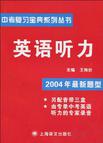中考复习宝典系列丛书 英语 听 力
出版时间:2003-12 出版社:上海译文出版社 作者:王伟状 编 页数:97
前言
随着上海市二期课程教材改革的不断深入发展,中学英语教学的目标不断更新,以及社会的发展对学生摄取信息和交际能力的要求不断提升,在上海市中小学课程教材改革委员会办公室和上海市教育委员会教学研究室共同制订的《面向21世纪上海市中小学外语学科教育改革纲领》中对中学生的“听的能力”提出了特别的要求:“能基本听懂用目标语所讲的言语和对话,能听懂新闻广播”。为此,上海市中等学校高中阶段招生文化考试的英语试卷中,听力部分比重有所调整,难度有所提高,题型有所变化。为使2004年参加中考的学生尽快适应考试题型的变化和要求,我们精心编写了一套“中考复习宝典系列丛书”。 本书系“中考复习宝典系列丛书”中的一本,共有20套中考英语听力模拟试卷。这些听力试卷都是根据2004年中考英语听力要求编写的,其题型、评分标准也与2004年中考英语听力的要求完全一致。本书还另配三盒听力音带。录音材料由专录中考英语听力的专家张晴,Dav朗读。希望学生经过本书训练后,能熟悉2004年中考英语听力的题型和要求,在考试中取得良好成绩。
内容概要
《英语听力(2004年最新题型)》系“中考复习宝典系列丛书”中的一本,共有20套中考英语听力模拟试卷。这些听力试卷都是根据2004年中考英语听力要求编写的,其题型、评分标准也与2004年中考英语听力的要求完全一致。《英语听力(2004年最新题型)》还另配三盒听力音带。录音材料由专录中考英语听力的专家张晴,Dav朗读。希望学生经过《英语听力(2004年最新题型)》训练后,能熟悉2004年中考英语听力的题型和要求,在考试中取得良好成绩。
书籍目录
Test OneTest TwoTest ThreeTest FourTest FiveTest SixTest SevenTest EightTest NineTest TenTest ElevenTest TwelveTest ThirteenTest FourteenTest FifteenTest SixteenTest SeventeenTest EighteenTest NineteenTest Twenty上海市2003年中考英语试卷参考答案及音带文字
章节摘录
5. W: Where are you going? M: Im going to the cinema. By the way, what time is it now? W: Its haft past six. Why are you in such a hurry? M: The film is going to begin in five minutes. Ill be late. Q: What time is the film going to begin? (A) 6. M: Hello, can I speak to John, please? W: Im sorry. He is not in right now. M: Do you know when he will be back? W: Im not sure. Would you like to leave a message? M: Yes, please tell him I will meet him at the school gate tomorrow afternoon. W: OK. Ill tell him when he comes back. Q. What did the woman ask the man to do? (C) Ⅳ. Listen to the passage and tell whether the following statements are true or false: Everyone knows that water turns into ice when the temperature is below 0℃, but do you know that warm water freezes more quickly than cold water? An Englishman, Sir Francis Bacon, said that almost 4 hundred years ago. But few people believed him at that time. Many years later, a Canadian scientist, George Kell, said that the Englishman was right. Dr. KeU filled an open box with cold water and then titled another with warm water. He put both outside. The warm water froze first! Dr. Kell later told why that happened. Because the boxes were open, some of the warm water changed into vapour. It went into the air, that means, less of the water was left to freeze, and so the warm water froze faster than the cold water. If you still do not believe Dr. Kell, do the experiment, please, and find the answer for yourself.
图书封面
评论、评分、阅读与下载
用户评论 (总计0条)
相关图书
- 中考可能考的物理试题
- 中考可能考的化学试题
- 中考可能考的语文试题
- 中考可能考的政治试题 (平装)
- 化学中考总复习(修订本)
- 高考英语听力模拟试题集
- 中考英语听力模拟试题集
- 高考新挑战
- 上海市高考试卷集
- 新世纪新模式高3英语备考试题集
- 高考英语听力应试指导及强化训练
- 上海市高考试卷集(1985-2000)政治.?历史?地理 (平装)
- 2008高考试题分析与评价(上海卷)
- 灌籃少年ACTⅡ(09)
- 淘气包
- 顽皮猴-超级爆笑脑筋急转弯
- 标准试卷(7A)(修订版)(配合牛津英语) (平装)
- 高考可能考的作文试题 (平装)
- 高考可能考的语文试题
- 高考可能考的数学试题 (平装)
- 高考考点精析.语文
- 仿真纸模型:科隆大教堂 (平装)
- 高考考点精析.数学
- 中国近代文学大系1840-1919・俗文学集(1)
- 工业化和经济增长的比较研究 (平装)
